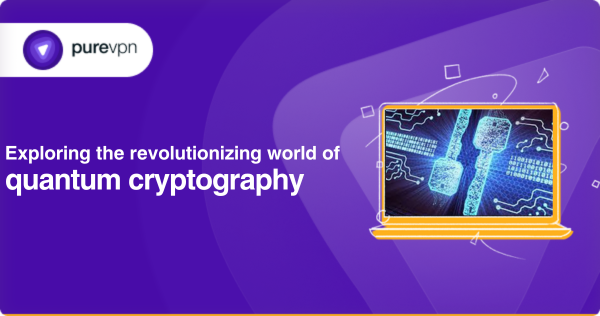Table of Contents
It is the modern cutting-edge technology that secures online communication channels by using quantum mechanics concepts. With the ever-growing threat of data breaches and cyberattacks, it was high time to come up with a practically impenetrable encryption solution that came in Quantum Cryptography.
In the following post, we’ll explain in detail what exactly quantum cryptography is, how it works, its advantages and disadvantages, and the future of its implementation.

What is quantum cryptography?
It is a type of encryption that secures communication by utilizing quantum mechanics. In other words, it encodes and decodes signals using quantum physics principles, making it incredibly difficult for anyone to intercept or eavesdrop on them.
The fact that measuring a quantum system will disturb it is at the heart of quantum cryptography. This means that if a third party tries to intercept a quantum message, it will inevitably change it in some way. This allows two parties to interact in a way that prevents eavesdropping because any attempt to intercept the communication will easily be detected.
It is frequently used to ensure secure communication between two parties, such as in
- banking transactions,
- military communications, and
- other sensitive applications where security is critical.
It is also utilized to create new forms of encryption and authentication, such as quantum key distribution, which uses quantum principles to produce and distribute secret keys for encrypting and decrypting messages.
Ultimately, quantum cryptography is a fascinating and fast-expanding field with enormous potential for altering our understanding of security and privacy in the digital age.
How does quantum cryptography work?
It is based on quantum mechanics principles, which harness the behavior of subatomic particles to securely transfer information. Unlike traditional cryptography, which uses mathematical procedures to encrypt and decrypt data, quantum cryptography depends on the physics of quantum particles to assure data security.
In layman’s terms, Quantum cryptography uses less mathematics and uses more Quantum science. Here’s how it works:
- It begins with the exchange of a secret key between two parties. While one party transmits the key using polarized photons, the other party measures it and counts the polarization of each photon.
- If the original measurement matches that of the measurement done by the second party, the secret key is accepted. If the measurement is inaccurate, it is discarded.
- The key’s security is ensured by scientific principles which dictate that any effort to measure a photon changes its polarization state. This means that any attempt to intercept or eavesdrop on the secret key is recognized immediately, and the measurement will not match the initial measurement.
Once the secret key has been generated, it may be used to encrypt and decrypt messages using classic encryption algorithms such as the Advanced Encryption Standard (AES). The use of a quantum key ensures that any effort to intercept the transmission will be discovered instantly, which is extremely beneficial for the key’s security.
What is quantum cryptography used for?
It has a wide range of applications and is already being used in a variety of industries. One of the most important uses is secure communication. Users can maintain the confidentiality of their communications and the security of their data by employing quantum cryptography.
Uses for quantum cryptography include:
- Cryptographic protocols: It can be applied to create numerous cryptographic protocols for secure communication, such as the Quantum Cryptographic Protocol, Quantum Teleportation Protocol, and Quantum Signature Protocol.
- Financial transactions: Financial firms can utilize it to protect the security of their transactions. For example, the China Construction Bank secures online transactions through a quantum network.
- Military and government communications: It can be used by governments and military agencies to safeguard their communication and data.
- Medical data: Medical data is very sensitive and must be kept private. It can be used to keep medical data safe and confidential.
- Cloud computing: Cloud computing entails storing and distributing data through the internet. Quantum cryptography may be used to safeguard data and maintain its privacy.
Overall, it has several applications and is expected to be employed in several industries in the future.
Benefits of quantum cryptography
1. It’s unbreakable nature
It provides several advantages over traditional encryption techniques. One of the most significant advantages is the unbreakable nature of its encryption. Unlike traditional cryptography, which is based on mathematical problems that powerful computers can answer, quantum cryptography uses physical rules to construct unbreakable encryption.
2. Ability to detect eavesdropping
Another advantage of is its ability to detect eavesdropping attempts. Because quantum communication is extremely sensitive to disruption, any attempt to intercept or investigate a quantum message will result in a change in the message’s state, which the receiver will quickly discover.
3. Best solution to protect sensitive data
Additionally, it provides greater protection for sensitive data transfer, such as in government or military communication. With this, sensitive data can be conveyed with the highest level of security and confidentiality, with no potential for interception or decryption by unauthorized parties.
4. Best for long-distance communication
Another advantage is its capability to provide secure communication across long distances, whereas traditional cryptography does not. This is because quantum entanglement allows for the instantaneous transmission of information over large distances, enabling the establishment of secure communication networks spanning entire countries or perhaps the entire globe.
Limitations of quantum cryptography
There are some limits to that you should be aware of:
1. It’s too expensive
The cost and complexity of developing quantum cryptography systems is one obstacle. These systems are more difficult to use than traditional cryptographic methods because they require expensive hardware and specialized knowledge to operate.
2. It has a limited range
Another disadvantage of quantum cryptography devices is their limited range. The quantum key distribution approach is only effective over short distances, typically a few hundred kilometers. This makes it harder to employ quantum cryptography to secure communication lines over extended distances.
3. It has some loopholes
Finally, while it offers a high level of security against certain kinds of attacks, it is not immune to all types of attacks. An intruder, for example, may intercept a quantum communication channel and measure the sent qubits, revealing information about the secret key. There are also concerns that improvements in quantum computing will enable attackers to breach some types of quantum encryption systems in the future.
Despite these drawbacks, i still has several advantages over standard cryptographic techniques, especially in terms of security. As technology improves, we should expect more advancements in quantum cryptography that may solve some of these shortcomings and make the technology even more secure and dependable.
Differences between traditional cryptography and quantum cryptography
In terms of security, traditional cryptography, and quantum cryptography operate quite differently.
How traditional cryptography works
Traditional cryptography encrypts and decrypts data using mathematical techniques that produce keys. These algorithms are designed to be difficult to read, making it harder for unauthorized users to access encrypted data.
Nevertheless, as computers get more powerful, traditional encryption becomes increasingly vulnerable to brute-force attacks, which include evaluating every possible key combination until the correct one is found.
How is Quantum cryptography better?
Quantum cryptography, on the other hand, employs quantum physics principles to create unbreakable keys. Quantum cryptography transfers information using photons, and the quantum nature of these particles ensures that any attempt to eavesdrop on the transmission is detected.
As a result, quantum cryptography provides essentially unbreakable security because any attempt to intercept the message will inevitably disturb the photons and alert the recipient to the presence of an eavesdropper.
In summary, traditional encryption employs mathematical approaches to generate keys and protect data, whereas quantum cryptography employs quantum physics principles to generate uncrackable keys and provide fundamentally unbreakable protection.
Future of quantum cryptography implementation
Although quantum cryptography is still in its infancy, its potential is enormous. It is projected to be used in several applications in the future, including network security, banking, and military applications.
Resistance to hacking: One of the most significant benefits of quantum cryptography is its resistance to hacking. As a result, quantum cryptography is anticipated to play an important role in the future of cybersecurity. We should anticipate seeing huge growth in demand for quantum cryptography as more people become aware of its benefits.
Yet, numerous challenges must still be addressed before quantum cryptography can be widely implemented. Apart from the limitations mentioned above, there are a few things that require improvement. One of these is to ensure that:
QKD protocols can be used over long distances. Presently, these protocols have a limited range due to service degradation. But using satellite-based communication, or using quantum repeaters, might be able to solve this issue in the future.
Another improvement that is sorely needed is to improve the performance reliability of single-photon detectors in QKD. As such, it is an ongoing area of research in the field. Improving the sensitivity or reducing their noise levels can go a long way toward making this technology more efficient in the future.
Furthermore, improving error correction and preventing side-channel attacks are improvements that we expect to see in Quantum cryptography in the future.
How PureVPN offers quantum cryptography
Although it is still in its early stages, there are a few companies that have gone ahead of the curve and adopted this technology as part of their feature set. One of these companies is PureVPN.
PureVPN promises unbreakable security and privacy to its users. To deliver on this promise, PureVPN has partnered with Quantinuum, the world’s largest integrated quantum computing company, to deploy Quantum-Resistant Encryption Keys.
But how does this help?
- It’s the technology of the future, which means your data remains future-proofed from quantum computing threats.
- It offers more secure communication channels
- It enhances remote work security
- It provides you with a safer online banking and crypto transactions experience
- It protects online blueprints from all types of illegal surveillance
By adopting quantum cryptography today, PureVPN ensures that its users will stay equipped to deal with any cybersecurity crisis that might arrive in the future.
You can learn more about PureVPN’s quantum-resistant encryption by clicking here.
Conclusion
It is a game-changing technology that provides unprecedented security for communication channels. While it is still in its early stages and has practical limitations, its potential uses make it a worthwhile technology to develop. Users can now enjoy a higher level of protection for their online activities thanks to companies such as PureVPN, implementing quantum cryptography.
Frequently asked questions
Quantum key distribution, or QKD, is the method of exchanging cryptographic keys between two parties using quantum mechanics principles. QKD helps enable the parties to generate and share a secret key which can then be used for secure communication.
Quantum cryptography is already being used for various applications such as secure communication between government agencies, military organizations, and financial institutions. Moreover, companies like PureVPN are also adopting this technology to ensure the safety and security of their users’ online communications.



